By Shkëlqim ABAZI
Part fourteen
SPAC
The Grave of the Living
Tirana, 2018
(My memories and those of others)
Memorie.al / Now in my old age, I feel it is my duty to tell my truth, just as I lived it. To speak of the modest men who never boasted of their deeds and of others whose mouths the regime sealed and buried them in nameless pits. In no case do I take it upon myself to usurp the monopoly of truth or to claim laurels for an event where I was a random witness, even though I tried with all my heart to help my friends, who politely and kindly avoided me: “Brother, open your eyes… don’t get involved… you only have two months and a little left!” A worry that clung to me like an amulet, from the morning of May 21, 22, and 23, 1974, and even followed me in the following months until I was released. Nevertheless, everything I saw and heard those three days, I would not want to take to the grave.
Continued from the previous issue
External appearance was the distinguishing feature of this man; if women wore their skirts four fingers above the knee, they were called prostitutes, and if men left sideburns below the ear, they had lost revolutionary vigilance. The small bone, or the “party bone”, which runs in a straight line with the eyelashes and ends where the arch of the ear begins, was the ideological boundary. The neo-naming of communist anthropological anatomy made the distinction between “homo-socialistus” and “homo-capitalistus-revisionistus”.
Woe to anyone who dared to leave sideburns below it, because they would face the fury of the Party Bureau Secretary, the Chairman of the Democratic Front and the People’s Council, the Youth Organization, the Women’s Organization, the Organization of Veterans of the Anti-Fascist National Liberation War, and especially the people of the State Security, who vigilantly monitored everywhere. This would be followed by a series of lightning-sheets, criticisms, self-criticisms, or, if they found any “knot” in your biography, prison awaited.
Vasil Dhimitriadhi, a Greek with a sad history, who spent twenty years in Albanian political prisons (which is unrelated to the topic), had to endure a month and a half of isolation because he had left his sideburns below the “party bone”! Even though a typical boil had appeared under the bone.
Neither his status as a Greek citizen, and therefore “imperialist-monarcho-fascist,” which ostensibly did not oblige him to follow our fashion, i.e., the “homo-socialistus” model, prevented Pjetër Koka from giving him a Mirdita-style beating and a month in the cell. Vasil’s objection and insinuation about the beards and mustaches of Marx, Engels, Lenin, and Stalin were met by operative Fejzi Liço with two more weeks in the cell, until… the boil healed.
Leshraphobia (hair-phobia) was instilled in the atrophic minds of the communist leaders, so much so that they even sent a barber to Rinas to shave and cut the hair of the Marxist-Leninist “bogeymen” who visited Socialist Albania.
But in camps and prisons, individuals with “contributions” were exempted from this rule and enjoyed the privilege of a double standard; for instance, roving spies, to be more effective in fulfilling their “patriotic duty,” had to have normal hair so they could deceive the victims with false stories of torture, posing as newcomers or recent arrestees. Even the officials of the Technical Office were allowed to keep their hair a bit longer than the general population, although legally, this privilege was only enjoyed by the mentally ill, who were shaved haphazardly due to chronic anomalies.
Many hustlers pretended to be sick to keep their hair a few centimeters longer, others formed alliances with the officials of the Technical Office to support them, and still others corrupted the doctor, even the barber, with a packet of “Partizani” cigarettes or a kilogram of sugar. But the majority fulfilled the obligation and was always seen shaved down to zero, which is why we were called: “the gang of bald men.”
The “Other Services”
The cutting of nails was also listed under “the others.”
For this service, you had to wait in line again at the barber’s, because the “instrument” this service required could not be performed without the presence of the police; otherwise, you’d be in trouble. If the command noticed that you had cunningly secured the “subversive” instrument, the barber would lose his job, while the “beneficiary” would spend the night in the cell and would feel lucky if he got off with just that. Ultimately, you were left to practice biting your nails with your teeth – those who still had them, of course – because those who had lost their teeth had to trim them with a hatchet.
Precisely because of these seemingly small but practically important services, the barber enjoyed a special status. Therefore, the craft was not enough to secure that position; extra “skill” was needed, for example, showing signs of rehabilitation and displaying them in daily life; in short, being a spy.
This was openly known, but we became thoroughly convinced when Gëzim Gazheli, one of the most sought-after barbers by Tirana’s youth in those years, ended up in Spaç and was “gifted” a hammer instead of scissors and a razor, while the farrier “hundaçi” (the big-nosed one), who had only shorn cooperative sheep in his free life, continued to run the shop.
The “hundaçi’s” lair had turned into a nest of gossip, like any barbershop, where nothing was left unsaid or unrepeated, twisted and turned over and over, good and bad things, but mostly bad things; he acted as a courier, transmitting the atrocities from inside out and vice versa. Every evening he appeared at the command post with his toolbox, held a “heartfelt conversation” with Fejzi Liço, naturally on the topic of “special haircuts,” and returned proud with his nose held high.
The “others” also included visits to the Kosovrast hospital. But to get a medical report from that ghoul, you had to be on your deathbed, specially recommended by the command, or close to his circle. However, to give him his due, he was a competent doctor; when I suffered accidental fractures in the mine, he made me human again. Nevertheless, besides his profession, he also knew bribery, and in special cases, friendship, as in my case.
Dental visits were also included here. But with his cheerful and jolly nature, Met Karakashi was available to everyone. Although you would leave a symbolic bribe even with him, he rarely had the right to issue a medical report, and even when he did; it was ignored, except for cases when you emerged from the gallery with a shattered jaw.
This group of services also included expenses at the camp store; naturally, for those who had money to spend, otherwise you saw it through binoculars… even though it was right in the middle of the camp.
But before you went to Nduja, you needed a coupon from Thanas Theodhoraqi. If he said there were none, even if you had money, you couldn’t buy goods; the currency was equal to nothing. Therefore, you had to “grease his wheel” too.
Whenever neo-communists scream about increased corruption in services and praise the “age of the onion,” the prison haunts me; the difficulties I experienced and the bribes offered to overcome them; from the head of the Technical Office, the brigadiers, the big-nosed barber, the camp crier, down to Kosovrasti, Met Karakashi, and Thanas the coupon-giver, and even the police and some opportunistic officers… who would leave you dry if you didn’t “grease their wheel.”
Corruption flows like a “golden wound” from the time of the worker-socialist period, perhaps even earlier. Today it is continued by scoundrels who descend genetically in a direct or indirect line from the rudimentary brood of the twisted ideological-political dogma. Naturally, the thief shouts: “Catch the thief!” and they spare nothing from being smeared, delving into the filth of the “age of the onion” to blacken the achievements of democracy.
But the idiom of my friend Sherif Allamani: “Ah my son, the world has become a mess, the legs have risen to give mind to the head, but as much as oregano can become an oak, so much can a brute become a nobleman,” best suits the despicable, faithless, and unprincipled braggarts who strut atop the podiums.
The roads were divided, and they are divided even now!
The Nightmare of the Third Shift
The day of a convict was filled with the troubles mentioned above, but also with other chores, such as body searches, or surprise ones in the dormitory, which often lasted for hours. It makes your mind reel to think of the torment they inflicted on us when we returned from the third shift! They gathered us in the pen like sheep and forced us to wait huddled together, as the moment caught us, in rain and snow, in cold and frost; they did not allow us to throw a piece of tarp over our heads, until sleep overcame us like exhausted horses, standing up.
As soon as they finished inside, they rushed outside, searching us down to our underwear. When you crossed the gate of the pen and entered the dormitory, you were choked by coughs, and your eyes burned amidst the mud, dust, and straw, so you collapsed like a spent horse from non-stop journeys. Even when you tried to set some order, you couldn’t, because before you could arrange your mattress, the whistle for the roll call blew. You rushed head over heels to go outside, where we would sometimes be kept for over two or three hours in the sun, under the rain, on ice, on snow, in the storm, whatever the weather, until we collapsed from sleep deprivation and snored right there on the ground.
At that point, the thugs intervened with rubber sticks and the tips of their boots: “Get up, who do you think you’re fooling, you filthy face!” We woke up from sleep bruised by the whip. Those lucky enough to escape with just that entered the dormitory and felt happy, because the others spent the night in the cells. And worse still, when the political commissar came and gave us two more hours of lectures, supposedly about the “endless sacrifices” the Party and the Great Leader were making for our rehabilitation, but we “ungrateful” ones did not want to appreciate them and stubbornly resisted like a mule.
“Nevertheless, the Party and Comrade Enver are trying to educate you, to turn you back to the Marxist-Leninist path, until you become worthy of socialist society and return to the bosom of rehabilitated families…!” bellowed Shahin Skura from the top of the terrace. Oh, shame, shame! After this panegyric speech, which tried to immerse us in the labyrinths incomprehensible to our “hostile” minds, and which lasted for an hour longer, the command “Disperse!” was given.
We returned to the dormitory clinging to each other. When we lay down in bed, our eyes wouldn’t close, because Malua would yell at the top of his lungs, calling one to the cells, another for a meeting, or distributing the mail, or…; and goodbye, sleep!
The Third Shift found us without closing our eyes and without eating anything, but the cycle had to be caught, the norm had to be fulfilled, etc., etc.,… because at the gallery door, Pjetër Koka was waiting with barbed wire and a rubber stick, then the electrical post, and finally, the cell…! Oh God! Nothing had changed from the old “MURDALLËKU” (Hell/Terror)!
It was the same prison life regulation, the same criminal cruelty, the same “snake hisses,” even more bitter, the same soldiers armed to the teeth, who uttered the call “stop or I will shoot” only after firing a couple of volleys, they were the same muzzled dogs, if not the most trained ones from the dog school; the same police officers with the same clothes and the same names. It was more “MURDALLËK” than “MURDALLËKU”! The troubles were endless; we felt more comfortable in the holes of Hades, where the galley (mine) swallowed us.
The Third Shift (Darkness and Hell)
After a week came the first day (more accurately, the night) of the third shift.
I somehow managed the first shift. During the week, I got to know the terrain, my group members, and the other sufferers who worked in that brigade and rejoiced at being in that zone, because they did not have to toil on distant roads and felt their heads a bit safer.
Seven days were enough for me to get used to the mine, the route, the rails, the turntables, the intersections; I noticed the pipes, the faults, the ventilation and escape funnels, where the corners and pockets were to take shelter in case of danger or when the mine smoke floated, I learned to maneuver the full and empty wagon, where I had to be careful not to derail it or cross the turntables, where to put my feet without getting caught in the sleepers, in what position to insert the stake into the wheels to brake, and where to release the rope and swing like on a carousel.
Now, we realized the norm more easily; I pushed and pulled seven or eight wagons even without the instructor’s help, and even at the same speed. On Sunday we should have rested, but they took us out to work. “Oh-uh-ah, the communists don’t know the law, brother,” repeated Xhelal Beu’s refrain. Sick, weak, and underfed, they could not meet the norm, consequently, the plan was not realized, and everyone was “attacked”! In prisons, the socialist slogan “One for all, all for one” was actualized more than anywhere else, in the inverted sense.
“Either the plan or your soul!” thundered Shahin Skura. “Your filthy ass cannot mess with the norms of the Party of Comrade Enver!” he added, moving his hands and feet. “Ehu-uu-a, how many filthy enemies like your face our eagle-eyed Party, led by the glorious Commander, Comrade Enver, has crushed! Work on Sunday, you hear! Make your complaints in writing!” -and he grinned at his perfect eloquence.
They took us out at six in the morning. We toiled until three; we were exhausted when we passed the control at the checkpoint and headed to the barrack. “Forget the books for today, only five hours separate us from half-past nine!” advised Arshini, and he headed to his dormitory. I gulped down the swill standing up and lay down, but sleep had migrated. I took out a book and read a few pages, until sleep overcame me. Prison sleep, surrounded by a halo of barbed wire!
“Get up, it’s evening, sleeper! What, are you going to get through prison with a guard at your head?”
This flood of words seemed to come from a loudspeaker hidden behind the pupulit panels. When two hands shook my feet, I opened my eyelids and looked around. When I almost collided with Zaka face-to-face, I opened my eyes wide like a child. “Get up, brother, you’re causing trouble!” he threw a jacket over my shoulders.
I went to the bathroom, and then ducked my head under the stream of water; when I returned to the barrack, I found the bowl of soup on the mattress. I don’t know what invisible hand had placed it on the plywood board, thrown a sheet of cement sack over it, and disappeared. I slurped a couple of spoonfuls, but my mouth was bitter; the wild dreams seemed to have cut my appetite.
I gathered rags around my filthy feet, put on my boots, and followed the others to the square, but the light of the projector, which fell obliquely from the watchtower, blinded me. I looked up to protect my eyes, but my gaze froze on a patch of sky, where some mysterious dots confronted me.
“Oh, o-oh, the stars,” they were petrified as if they had been plastered with handcuffs to the celestial dome. “Where are you, O God?” I sighed the secret, but I noticed only darkness. “Forget God, quickly in line,” ordered the brigadier. I crossed the gate with the line that had been engulfed by darkness and blindly took the tuff stairs, through the darkness. The barracks of the ordinary prisoners, who daily repeated: “We dug the grave for the enemies,” had been swallowed by the darkness.
“May you perish, O God,” I cursed out of force of habit and exchanged words with the shadows, (excuse me, with the workers of the second shift, who were surrounded by darkness). “May God protect you and may you return healthy,” they wished, “Forgive us!” we replied and disappeared into the darkness. We took the carbide ration, filled the wagon with bodies and darkness, and plunged into hell. We descended into the belly of the mountain, where we began the daily ritual; we filled and pushed the wagon inside the entrails, pulled it out of hell into darkness, and at the trimosha (dumping area), we threw it back into hell.
At dawn, I was getting dizzy. “What time must it be?” I asked Arshini. “I don’t know!” he shook off his drowsiness and answered with hesitation. “Hey, did you just ask about the time!?” I was calculating how much time separated us from the morning. “Brother, there is no time or morning here, they have eliminated everything!” “Fine, the evenings, but they messed with the mornings too, what’s wrong with the clock?” “What’s wrong, you ask?! They’ve imprisoned it, comrade!” “What harm did it do?” “The communists haven’t left anyone without declaring them an enemy of the Party and the people, you fool!”
“Even the clock?” “The clock first!” “What the devil is wrong with it?” “Hey, you’re a complete simpleton! Haven’t you heard the curse; ‘May your hour be cut short?’ Well, it reminds them of death and the moment they will lose power!” “What do they use for orientation then?” “The victorious teachings of Marxism-Leninism!”
“I meant as a concept?” “The Sun of Mao, rising from the East of the Far East!” “I asked about time as a sense, my friend!” “You’re looking for sense from the communists?! These people have no morals, let alone…” “But the others, they have plenty of!” “They have bullets and handcuffs, two pairs for every Albanian! But they also have a bell!” “It’s not ringing?” “If you miss it, listen to the pistol!” “I was talking about the bell, dear colleague.”
“Why, aren’t you getting a sound from this metal here?” – And he hit the metallic body with his palm like a bear’s paw. “May I never see its color? I asked about the clock!” “Go out and count the stars!”
Behind the wagon, I went out from the underground hell into the above-ground darkness. In the mouth of the stream, the lights of the enclosure blinked like distant glow-worms, while in the celestial space, amidst a circular puddle surrounded by barbed wire, the stars shone the spears driven into the imprisoned heart of the sky.
Meanwhile, a patch of mist reddened the crest. “Did they bleed the sky too, O God?” “What are you rambling about, my friend?” “They executed the horizon too!” “Who are you talking to?” asked the wilderness. “To the night.” “Remove the safety and turn the cauldron!”
I released the hook as usual, and the cauldron tilted with slowed movements, like figures in animated films, and almost took me into the abyss. The rattling of the stones on the tin sheets of the trimoza (dumping area) broke my reverie. “Jemin?” I called the colleague. The echo was lost in the wilderness.
I had spoken to the shadow of the friend who stayed to help Arshini raise the formwork. Out of inertia, I had pushed the wagon through the paths of hell, maneuvered on the turntables, and dumped it in the trimoza. The fresh air hit me and woke me up.
At the work front, we gathered the little material that remained at the base of the rock, but the dust from the hammer blocked my nose and obscured my vision. Arshini pressed his heavy body onto the iron handle, just like the astronaut steering the ship amidst orbital nebulae. Memorie.al




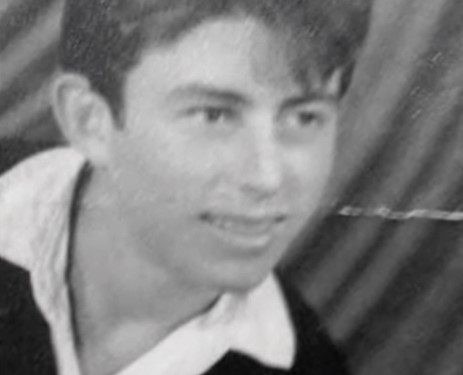
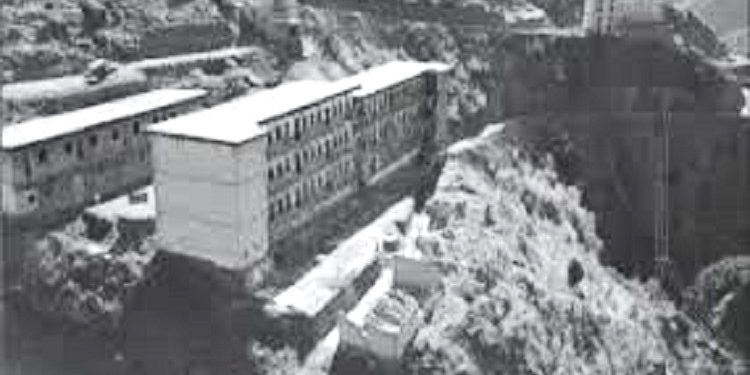
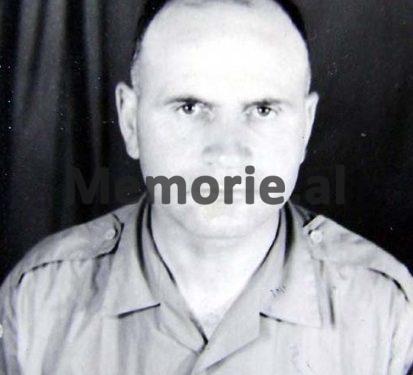
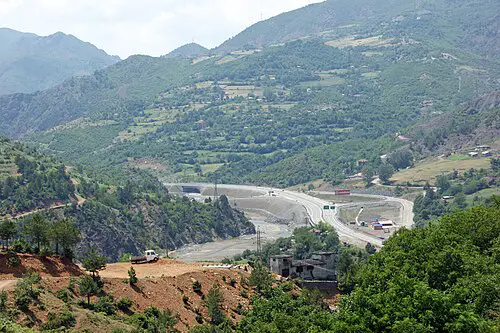
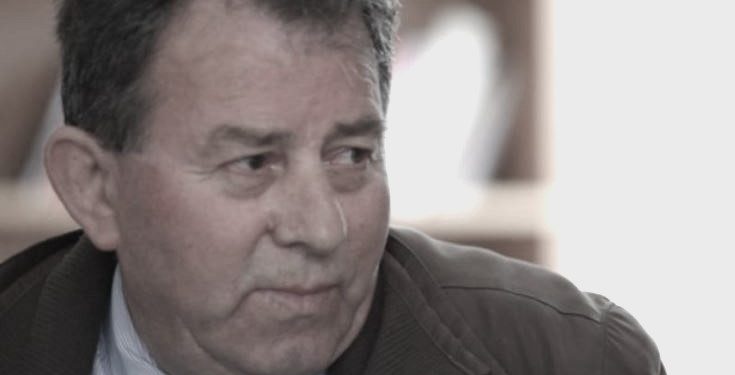
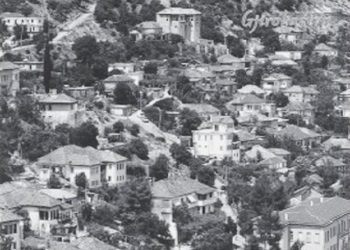
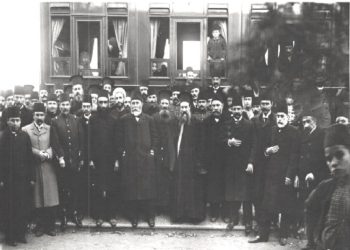
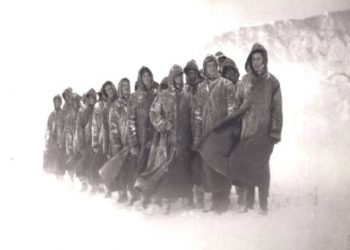

![“When the party secretary told me: ‘Why are you going to the city? Your comrades are harvesting wheat in the [voluntary] action, where the Party and Comrade Enver call them, while you wander about; they are fighting in Vietnam,’ I…”/ Reflections of the writer from Vlora.](https://memorie.al/wp-content/uploads/2025/06/admin-ajax-4-350x250.jpg)

